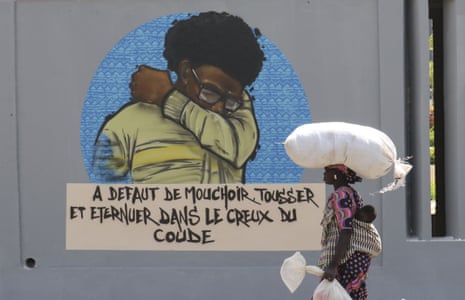Government ministers across Africa have called for the suspension of debt interest payments as the Covid-19 crisis deepens.
The numbers of cases being reported in Africa are still behind Europe and the US but rises are being confirmed in South Africa, Kenya, Egypt, Algeria and Burkina Faso, among others, and there is fear of what economic consequences the pandemic might wreak.
On Monday the heads of the World Bank and the International Monetary Fund expressed support for debt relief to help countries strengthen their health systems in readiness.
During a conference call for G20 ministers on Monday, the IMF’s leader, Kristalina Georgieva, pointed to the replenishing of funds used in a debt relief and aid mechanism during the 2014 Ebola epidemic that struck three African countries.
The ministers also requested that principal payments – the actual debt payment, as opposed to interest charges – be waived for fragile states, where people are deeply vulnerable to a pandemic.
Tim Jones, head of policy at the Jubilee Debt Campaign, said that extending a moratorium to actual payments due this year would be the “fastest way to keep money in African countries”.
“All creditors need to respond quickly by accepting this call,” he said.
David Malpass, head of the World Bank, also supported a suspension of all debt payments for the poorest countries. But he went on to say that countries should implement free-market economic policies, such as removing regulations and subsidies.
This is consistent with the bank’s long-term approach but is in direct contrast to the sharp rise in state intervention taking place in countries like the UK, where railway services have temporarily been renationalised, and workers and businesses are being offered support during the crisis. The G7 has also pledged “whatever is necessary” as the global economy heads towards recession.
Jones said the World Bank head should “act first to suspend the debt payments he has control over, then call on other creditors to join him”.
“It is outrageous that David Malpass is using this crisis to push an extreme economic ideology, at a time when state interventions are needed more than ever to fight this health and economic crisis,” he said.
Jesse Griffiths, programme director at the ODI thinktank, supports the call. “Now is the time for bold action and it must come with no strings attached. Lenders shouldn’t be delaying or putting conditionalities on emergency assistance at a time like this,” he said.
“These countries are going to be hit very hard by the economic slowdown in the rest of the world, including China. Commodity prices have collapsed, trade is grinding to a halt. There’s going to a huge debt crisis across the continent.”
According to calculations by the Jubilee Debt Campaign, the 76 countries referred to by Malpass are due to spend $18.1bn (£15.5bn) this year on debt payments to other governments, $12.4bn to multilateral institutions and $10.1bn to external private creditors.
